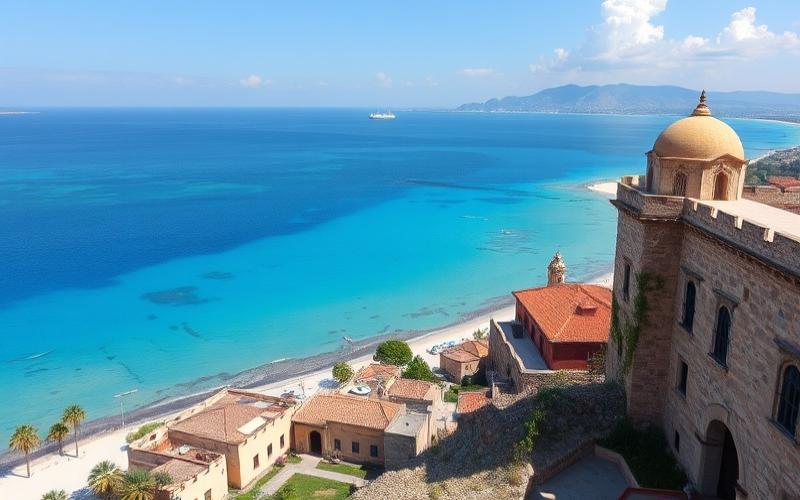
 Published on and written by Cyril Jarnias
Published on and written by Cyril Jarnias
Turkey, a cultural crossroads between Europe and Asia, is attracting more and more international students eager to experience a rewarding academic journey while exploring a country rich in traditions.
With a wide range of attractive scholarships, ranging from programs funded by the Turkish government to initiatives offered by private institutions, foreign students find numerous opportunities to ease their financial burden.
Furthermore, the country places particular emphasis on the quality of student housing, which ranges from modern university residences to affordable rental solutions, thus providing a comfortable and stimulating living environment.
This article guides you through the different funding and housing options, essential for planning your studies in one of the world’s most dynamic study destinations.
Traveling to Study in Turkey: What You Need to Know
Administrative Procedures for Studying in Turkey
To study in Turkey as an international student, it is essential to obtain a letter of acceptance from a recognized Turkish university or institute. This letter is the prerequisite for starting the student visa application process. Depending on nationality, some exceptions exist (for example, French nationals no longer need a student visa but must apply for a residence permit upon arrival).
Documents Required for the Student Visa Application:
- Valid passport (at least 6 to 12 months validity)
- Official letter of acceptance from the Turkish institution
- Completed visa application form
- Recent passport-sized photos
- Proof of sufficient financial resources
- Proof of accommodation or housing reservation
- International or Turkish health insurance
- Receipt of application fee payment
- Depending on the case: motivation letter, flight reservation, internship agreement (for internships)
Summary Table of Main Documents
| Document | Detail |
|---|---|
| Passport | Valid 6 to 12 months after the exit date |
| Letter of Acceptance | Original, issued by the Turkish university/school |
| Application Form | To be filled out online or at the consulate |
| Passport Photos | Recent, passport format |
| Proof of Resources | Bank statement or sponsorship letter |
| Health Insurance Certificate | International or Turkish |
| Proof of Housing | Residence certificate, reservation, etc. |
| Fee Payment Receipt | Fees vary by country and procedure |
Housing Options for Students in Turkey
- University Dormitories (Student Residences)
Most common housing, often on or near campus. Offers an international environment, shared services, and generally affordable cost. - Shared Apartments
Popular solution for more independence. Students share costs and daily life with other roommates, local or international. - Studios or Private Apartments
More expensive, but more privacy. Recommended for those who prefer a quiet setting or come as a couple/family. - Other Alternatives
Host families, private pensions, youth hostels, especially for short stays or language trips.
Housing Options Comparison Table
| Housing Type | Advantages | Disadvantages | Average Cost/Month (EUR) |
|---|---|---|---|
| University Dormitory | Proximity, security, social life | Less privacy | 100-300 |
| Shared Apartment | Independence, shared costs | Search effort, adapting to roommates | 200-400 |
| Private Studio | Privacy, freedom | Higher cost | 300-600 |
| Host Family | Cultural immersion, meals included | Family rules | 250-500 |
Cultural Life and Student Experiences
- Extracurricular Activities: university clubs, sports, music, theater, debates, excursions organized by universities.
- Learning Turkish: many institutions offer Turkish language courses for foreigners. Learning Turkish facilitates integration and daily life.
- Exploring Historical Sites: Istanbul, Ankara, Izmir, Antalya and other cities offer unique historical and cultural heritage (mosques, palaces, ancient ruins, museums, traditional markets, etc.).
- Student Events: festivals, intercultural meetings, international days, culinary and artistic workshops.
Economic Aspects and Scholarships
Cost of Living (excluding tuition fees): generally lower than in many European countries.
- Housing: 100 to 600 EUR/month depending on type
- Food: 100 to 200 EUR/month
- Transportation: 20 to 40 EUR/month (student discounts)
- Miscellaneous (leisure, phone): 50 to 100 EUR/month
Scholarships: several universities and the Turkish government (Türkiye Bursları program) offer scholarships covering all or part of tuition fees, housing, and sometimes a monthly stipend. These aids significantly ease the budget of international students.
Practical Tips for Adapting to Life in Turkey
Climate: a very large country, with significant variations (Mediterranean in the south, continental in the center, oceanic in the north). Pack clothing suitable for the host region.
Social Practices and Customs:
- Warm welcome, importance of politeness (greetings, respect for elders)
- Respect for religious traditions, especially during Ramadan
- Relative punctuality, importance of social connection (inviting/being invited for tea)
- Appropriate dress code in places of worship
Integration Tips:
- Learning a few basics of Turkish facilitates daily tasks and integration
- Be open to discovering local cuisine (kebabs, mezze, pastries)
- Inquire about administrative procedures (registration with Turkish social security, opening a bank account, student transport card)
- Participate in university events to expand your social network
Key Takeaway: Properly preparing administrative procedures, exploring different housing options, immersing yourself in the local culture, and taking advantage of financial aid are the keys to a successful experience for an international student in Turkey.
Good to Know:
To study in Turkey, international students must obtain a student visa, required with an acceptance letter from a Turkish university, a valid passport, and proof of financial resources. For accommodation, options include university dormitories, often more affordable, shared apartments, or even host families for optimal cultural immersion. Living in Turkey offers a rich cultural palette, with varied extracurricular activities and learning Turkish, while discovering historical sites like Istanbul or Ephesus enriches the educational experience. The cost of living is relatively affordable, and scholarships can significantly relieve expenses related to tuition and housing. For integration, understanding local customs, such as greeting with a smile or discovering Turkish cuisine, can ease adaptation, as can preparing for climate variations between coastal and inland regions.
Student Scholarships: Funding Your Studies in Turkey
Student scholarships in Turkey offer varied opportunities for international and local students, covering several levels of study and institutions.
Types of Scholarships Available:
- Turkish Government Scholarships (Türkiye Bursları): primarily for international students, covering undergraduate, master’s, PhD, and research. They include a monthly stipend (3,500 TL for undergraduate, 5,000 TL for master’s, 6,500 TL for PhD), tuition fees, a one-year Turkish language course, university or private accommodation covered by the scholarship, comprehensive health insurance, and a round-trip flight ticket. University placement is guaranteed.
- Institutional Scholarships: offered by certain Turkish universities and private or international organizations; they vary by institution in terms of amount and coverage.
- Specific Programs: such as research scholarships or language modules for foreign researchers or civil servants.
Eligibility Criteria:
- Open to all nationalities except Turkish citizens (and those who have lost their citizenship).
- High academic level demonstrated by transcripts.
- Social/cultural commitment sometimes valued in certain programs.
- For graduate cycles: letter(s) of recommendation required; motivated project/personal statement often required.
Application Process:
- Registration exclusively online on the official Türkiye Bursları portal between early January and mid/late February each year.
- Submission of translated supporting documents (diplomas/transcripts/letters).
- Selection based on application then possible interview with an international jury.
Important Deadlines to Respect:
| Step | Period |
|---|---|
| Application Opening | January 10 |
| Closing | Between February 20 and 23* |
| Results | May-June |
Practical Tips to Maximize Your Chances:
- Prepare all documents well before the portal opens (certified translations).
- Craft the motivation letter carefully, highlighting academic/professional projects related to Turkey.
- Choose universities/departments wisely when selecting on the form.
- Request personalized recommendation letters from teachers familiar with your background.
Testimonials from Beneficiary Students:
“Thanks to this scholarship I was able to study without worrying about housing costs or medical fees. The stipend covers my daily needs like local transport and food.”
“I received support upon arrival with an intensive Turkish course which allowed for better integration.”
Financial Impact on Student Budget:
A scholarship student generally benefits from:
- Full waiver of university fees
- Accommodation covered
- A monthly stipend often allowing:
- Partial/full coverage of food costs
- Regular urban transportation
- Social/cultural activities
Summary Table
| Covered Fees | Yes / No | Comment |
|---|---|---|
| University Fees | Yes | Full coverage |
| Housing | Yes | University residence included |
| Health Insurance | Yes | Comprehensive coverage |
| Flight Ticket | Yes | Round-trip start/end of studies |
| Monthly Stipend | Yes | According to level |
| Daily Life | Partially | Depends on city/local cost of living |
In Summary,
- Student scholarships provide significant financial autonomy throughout the academic stay,
- They are accessible through a selective but transparent process,
- Meticulous preparation significantly increases your chances in the face of strong international competition,
- Beneficiaries emphasize their decisive role in their academic success and social integration within Turkish campuses.
Good to Know:
Turkey offers a variety of scholarships to international and local students, notably the Turkish government scholarships known as “Türkiye Bursları,” as well as other scholarships offered by universities and private organizations. Eligibility criteria vary but generally include academic requirements and proof of financial need. To maximize your chances, carefully prepare your application, ensuring all necessary documents are up-to-date and strictly respect application deadlines, often open between January and February. Testimonials from beneficiary students illustrate that these scholarships can cover a substantial portion of tuition fees, housing, and significantly reduce daily living costs in Turkey, thus easing a student’s overall budget. Furthermore, improving your Turkish language skills and participating in extracurricular activities can enhance your profile. These financial aids are not only economic support but also an opportunity for cultural immersion and personal enrichment, as attested by those who have benefited from this unique experience.
Finding Student Housing in Turkey: Practical Tips
Types of Student Housing in Turkey
- Public University Dormitories: economical (around $40 to $70/month), often include meals, located on or near campus, shared with 2 to 4 students, but generally closed in summer.
- Endowment Student Housing: managed by religious or charitable foundations, secure and sometimes free, ideal for very tight budgets.
- Private Apartments: studios or full apartments, offer more privacy and comfort, with prices varying by city and neighborhood.
- Shared Housing (Roommates): very popular, especially in Istanbul, allows reducing rent costs and promotes an active social life.
- Alternative Housing: renovated buildings (old schools, offices), tiny houses, eco-friendly modules, and co-living spaces, innovative and sometimes more affordable solutions.
Main University Cities and Student Neighborhoods
| City | Recommended Student Neighborhoods |
|---|---|
| Istanbul | Kadıköy, Beşiktaş, Şişli, Fatih, Üsküdar |
| Ankara | Çankaya, Kızılay, Bahçelievler, Kolej |
| Izmir | Bornova, Alsancak, Karşıyaka |
| Bursa | Nilüfer, Görükle |
| Antalya | Muratpaşa, Konyaaltı |
Tip: prioritize neighborhoods close to your campus to limit commuting and transportation costs.
Tips for Housing Search
- Start your search several months in advance, ideally between June and August, as demand is high at the start of the academic year.
- Consult specialized student websites (Erasmus Play, CampusTurquie, Turkish Council), Facebook groups, university forums, and rental apps.
- Use reputable local real estate agencies to avoid scams.
- Always visit the housing before signing a contract.
- Prepare necessary documents: passport, letter of acceptance, sometimes a guarantor or proof of income.
Average Costs and Saving Strategies
| Housing Type | Monthly Price Range (USD) |
|---|---|
| Public Dormitory | 40 – 70 |
| Endowment / Foundation | Free – 50 |
| Shared Housing | 100 – 200 |
| Private Apartment | 200 – 400 (outside Istanbul) |
| Apartment in Istanbul | 300 – 600+ |
- Share housing to split costs.
- Target less central but well-served neighborhoods.
- Look for all-inclusive offers (rent, utilities, Internet).
- Prioritize furnished housing to avoid buying furniture.
Administrative Formalities
- Rental Contract: always demand a written contract, in Turkish or English, stating the rent amount, duration, security deposit (often one month’s rent), and termination terms.
- Subscription to Public Services: for a private apartment, you may need to open water, electricity, gas, and Internet accounts in your name. Prepare a copy of the rental contract, ID, and a residence address.
- Residence Registration: mandatory with the local administration (Nüfus Müdürlüğü) within 20 days of moving in.
- In shared housing, collective living is based on communication and respect for privacy.
- Shared meals are frequent, but everyone often manages their own groceries and cooking.
- Turkish hospitality translates into gestures of friendliness: sharing tea, invitations to meals, etc.
- Respect quiet hours (especially in the evening) and house rules set collectively.
- Get involved in campus association life, participate in student events, and don’t hesitate to learn a few words of Turkish to facilitate your integration.
Key Takeaway:
Organize early, explore all housing options, prioritize proximity to campus, and be attentive to administrative procedures for a successful setup in Turkey.
Shared housing, very common, is an excellent way to immerse yourself in the local culture and create lasting bonds.
Good to Know:
In Turkey, students have several housing options, including university dormitories, often affordable and located near campuses, or private apartments and shared housing, ideal for those seeking more independence. Main university cities like Istanbul, Ankara, and Izmir offer diverse opportunities, with popular neighborhoods such as Beşiktaş in Istanbul. To find housing, the summer period is ideal, and digital platforms like Sahibinden or local agencies can be very helpful. Rents vary by city, generally higher in Istanbul, but shared housing allows splitting costs and saving. Regarding formalities, it is essential to understand rental contracts and plan for subscribing to public services. To facilitate integration, learning about local customs, respecting shared spaces, and being open to discussions can help.
Tips for International Students in Turkey
Practical Tips for International Students in Turkey:
- Prepare for cultural diversity: Turkey combines European and Asian influences, with strong local customs (respect for elders, importance of community, hospitality).
- Adapt your communication: it’s common to use typical Turkish gestures and expressions; learning about local greetings or humor facilitates integration.
- Participate in national holidays and student events to better understand society.
Essential Administrative Procedures:
- Obtain an official acceptance letter from your university before any procedure.
- Apply for a student visa at the Turkish embassy or consulate in your home country; prepare a valid passport, financial proofs, and health insurance.
- Once arrived, apply for a residence permit (“ikamet”) with the local authorities. This document is essential for legal residence during your studies.
| Procedure | Required Documents | Where to Apply |
|---|---|---|
| Student Visa | Acceptance letter, passport | Turkish Embassy/Consulate |
| Residence Permit | Passport, student visa, photos | Provincial Directorate of Migration |
Adaptation to Local Life:
Affordable Housing
- Prioritize university dormitories to reduce costs.
- Explore the rental market via dedicated platforms or international student groups.
- Always negotiate the contract and verify that all utilities are included.
Daily Life
- Familiarize yourself with the local banking system upon arrival (opening an account).
- Use popular mobile apps in Turkey for transportation (public transport) or shopping.
Academic Success
- Engage in peer study groups to exchange on teaching methods specific to the Turkish system (highly structured lectures, rigorous grading).
- Take advantage of university tutoring and regularly seek advice from academic advisors.
- Ensure strict adherence to administrative deadlines (course/exam registrations).
Resources Available in Turkish Universities:
International Student Associations
Join them upon arrival; they offer cultural mentoring, social activities, and logistical support.
Specialized University Services
- Academic orientation
- Psychological support
- Language assistance to improve Turkish or English
Useful Platforms
- Local student forums
- Online resources specialized in housing/administrative matters
Key Tips
- Always keep paper/scanned copies of all official documents.
- Regularly inquire about your rights as a foreign student via student associations or university services.
- Be proactive in building a multicultural social network—this fosters both academic success and personal fulfillment.
| Aspect | Practical Tip |
|---|---|
| Educational System | Participate in study groups / Tutoring |
| Social/Cultural Life | Join international associations |
| Housing | Prioritize university dormitories / Platforms |
| Administrative Procedures | Prepare all documents in advance |
Remember: each university offers its own services dedicated to foreign students—inquire directly with the international office upon your arrival!
Good to Know:
For international students in Turkey, obtaining a residence permit is essential and must be done quickly after arrival; it is advisable to familiarize yourself with the application system to avoid complications. For housing, explore university dormitories, shared housing, or private apartments for affordable options, using local platforms to compare prices. Cultural integration involves adopting a few local codes, like removing shoes when entering someone’s home, and trying the Turkish language to facilitate daily interactions. In the Turkish educational system, understanding course structure and building relationships with professors can be valuable for success. For additional support, international student associations and orientation services at universities are precious resources offering workshops, social events, and administrative help.
Disclaimer: The information provided on this website is for informational purposes only and does not constitute financial, legal, or professional advice. We encourage you to consult qualified experts before making any investment, real estate, or expatriation decisions. Although we strive to maintain up-to-date and accurate information, we do not guarantee the completeness, accuracy, or timeliness of the proposed content. As investment and expatriation involve risks, we disclaim any liability for potential losses or damages arising from the use of this site. Your use of this site confirms your acceptance of these terms and your understanding of the associated risks.

























































